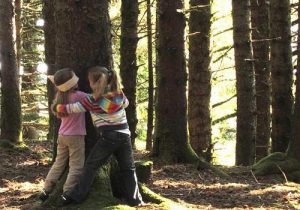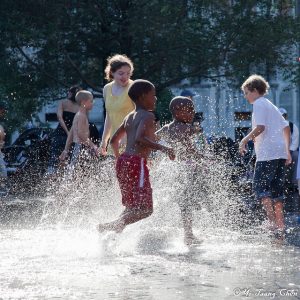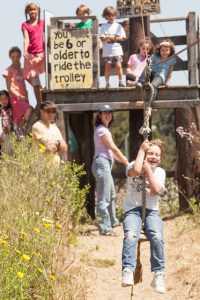Primed for Play – Responding to our children’s instinctive play needs
11th July 2017
Share this entry:
Along with bonobo apes and chimps, we’re in the top 3 most playful creatures on Earth. To most of us this will come as no surprise: watching them rolling, climbing, jumping, running – testing their bodies and minds at every opportunity – it is obvious our children love to experiment and explore. Play is vital to children’s health and wellbeing, so how can we ensure our children get to play in ways that suit their primal nature?

Unfortunately many of us no longer have easy access to woodlands and streams, but even so, we can do our best to create or discover settings that mimic some of nature’s essential play qualities. Here are some ideas:
1) Get messy – get wet!
If you can’t access a natural body of water, look for water in public places. Public fountains offer endless fun. Or combine a grassy patch with a bucket of water. Remember to bring a towel!
2) Allow them to roam
Research shows that since the 1970s children’s ‘radius of activity’ has declined by 90%. Children need to experience a degree of independence to become sensible responsible adults, so offering them opportunities to go out on their own is important. If you are worried, start small: take a measure of what your child is ready for – going to the corner shop, walking to school, going to the park – and encourage them to go with a friend.

Unlike commercial adventure playgrounds, community adventure playgrounds are created by the children themselves with help from qualified play workers who know how to keep your child safe while giving them the freedom they need to experiment and take risks. If there isn’t one near you encourage your council to open one or organise a pop-up adventure play event.
4) Get creative
Create a collection of what is known in the trade as ‘loose parts’ – objects of all shapes and sizes that, combined with a child’s imagination, open up a world of possibilities: logs, shells, small bits of wood, egg cartons, rope. The sky’s the limit.
5) Reclaim your street
Not so long ago our streets were filled with kids playing hopscotch, tag, skipping games and getting up to all sorts of shenanigans, which made up their own unique child culture. Street games are a great way for kids to connect, get fit and develop social skills.
6) Make a den
Children need quiet reflective time too. Create cosy dens, in the garden or indoors, that encourage children to huddle together, share stories and secrets or read their favourite book.
These ideas offer children play that is self-directed and open-ended, encouraging them to use their own imaginations, test their physical skills, develop strong relationships and experience the delight and freedom they deserve.
Inez Aponte is a free play advocate and community organiser. She works for Earth Wrights, a small Devon based company that specialises in the design and build of natural play spaces.
Photo one: Photo by USFWS Alaska/ CC BY 2.0
Photo two: Photo by Yi Tsang Chen/ CC BY 2.0
Photo three: Photo by Thomas Hawk/CC BY 2.0
Photo four: Photo by SeeBeeW/CC BY 2.0
Click here to register for your free tickets to attend Childcare Expo Midlands on 29th & 30th September 2017.
Why attend Childcare Expo?
Join over 2,500 like-minded individuals from the early years sector who are dedicated to improving both practice and their childcare settings.
Attend educational seminars to credit your CPD
Meet the experts to have your questions answered
Receive fantastic onsite offers and discounts
Experience expert-led informative hands-on workshops
Network with peers and industry players
Pick up hundreds of new product ideas and services
And most of all, enjoy a great day out with your colleagues




